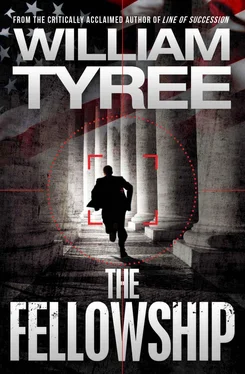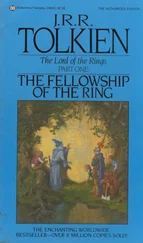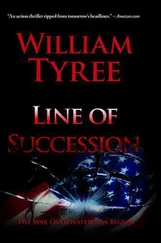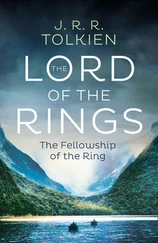William Tyree - The Fellowship
Здесь есть возможность читать онлайн «William Tyree - The Fellowship» весь текст электронной книги совершенно бесплатно (целиком полную версию без сокращений). В некоторых случаях можно слушать аудио, скачать через торрент в формате fb2 и присутствует краткое содержание. Год выпуска: 2013, Издательство: Massive, Жанр: Триллер, на английском языке. Описание произведения, (предисловие) а так же отзывы посетителей доступны на портале библиотеки ЛибКат.
- Название:The Fellowship
- Автор:
- Издательство:Massive
- Жанр:
- Год:2013
- ISBN:нет данных
- Рейтинг книги:5 / 5. Голосов: 1
-
Избранное:Добавить в избранное
- Отзывы:
-
Ваша оценка:
- 100
- 1
- 2
- 3
- 4
- 5
The Fellowship: краткое содержание, описание и аннотация
Предлагаем к чтению аннотацию, описание, краткое содержание или предисловие (зависит от того, что написал сам автор книги «The Fellowship»). Если вы не нашли необходимую информацию о книге — напишите в комментариях, мы постараемся отыскать её.
The Fellowship — читать онлайн бесплатно полную книгу (весь текст) целиком
Ниже представлен текст книги, разбитый по страницам. Система сохранения места последней прочитанной страницы, позволяет с удобством читать онлайн бесплатно книгу «The Fellowship», без необходимости каждый раз заново искать на чём Вы остановились. Поставьте закладку, и сможете в любой момент перейти на страницу, на которой закончили чтение.
Интервал:
Закладка:
Laughter swelled from the adjoining hall. Kruger turned to look.
“Don’t worry about them,” Wolf said. “It’s good to see you. Of all the teachers, you were the best. Do you remember how you would sometimes let us stay after school? We could ask you about any subject, and you would talk for hours.”
“Don’t be delusional,” Kruger snapped. “Everything has changed. What do you want from me?”
Wolf reached into his overcoat and removed a piece of paper. He set it on the table and unfolded it. On it he had written the foreign letters that he had watched Hoffman write with his own blood. “Do you recognize this?”
A waiter walked past on his way from the kitchen to the next room. Kruger turned and waited until he was out of earshot before speaking. “Where did you see this?”
Wolf hesitated. “France,” he said, but thought better of providing more details.
“Odd,” the priest said. “At the Louvre, perhaps?”
“No.” Wolf sipped his beer, relishing the way the bubbles percolated on his tongue.
“The writing is an ancient form of Aramaic,” Kruger said, his demeanor warming slightly. He slurped the foam from the top of his own mug. “And why is a Nazi asking me to translate a language that is most commonly associated with ancient Jews?”
“I’m not a Nazi,” Wolf said in a voice that was at once defensive and yet barely audible. “At least not by choice.”
“We all have a choice, Sebastian. I chose not to indoctrinate my students with propaganda. For that I spent three years in Dachau prison.”
The bite in Kruger’s tone was palpable. “I admire you for what you did.”
“What good did it do? The result of my pride is sitting right in front of me.”
Wolf felt suddenly small. “I was drafted,” he explained. “Besides, the Ahnenerbe is a sort of research organization, full of academics.”
“That description is generous, if not completely inaccurate. The Ahnenerbe generates politically convenient propaganda through the study of ancient Germanic cultures.”
“Well, you could — ”
“That’s not up for debate. So I’ll ask you again. Why is a Nazi asking me about a language spoken by ancient Jews?”
Wolf lowered his voice a notch. “I watched a man die while writing those letters in his own blood. He seemed to think they were important, and I’m trying to find out why. I owe him that much.”
The ex-teacher took a long drink from his beer stein. He studied the writing once again. “The words are very simple and clear. Yeshua bar Yehosef. Jesus, son of Joseph.”
The young soldier sat back in his chair, contemplating what he had just heard. The Holy Ossuary. Could it be true? Could it be the ossuary of Jesus? The Gospels and the apocryphal texts differed slightly on some points, but the primary narrative was well-established. Jesus had been crucified, and had died at some time before Longinus the Centurion had come with his famous spear. A wealthy man named Joseph of Arimethea, with the help of Nicodimus, had volunteered to take the body. They applied myrrh and aloes and placed the body in a tomb that Joseph had in fact created for himself. Three days later, Mary Magdalene had visited the tomb with two others and found it empty. The body had vanished. Soon afterwards, she had been the first to witness the resurrected messiah. Not as a ghost, but in the flesh. The existence of a Holy Ossuary would call into question the literal interpretation of the resurrection itself.
Wolf did not care what Himmler believed. He did not care what Dr. Seiler believed. They weren’t even Christians. But the fact that the ossuary with Jesus’ name on it had been kept in one of the world’s great churches was another matter. Clearly, someone powerful within the church had believed it.
If only Kruger were still a priest, Wolf thought. Then I would confess what I saw. I would even confess what I have done.
“I learned Aramaic when I was a young apprentice,” Kruger volunteered. “Back in the days when his Holiness Pope Pius XII was known as Nuncio Pacelli, I had the pleasure of serving him here in Munich. He knew of my fondness for languages. We would often speak Italian and of course, Latin. One summer he and his housekeeper, Sister Klara, arranged for me to apprentice in the Vatican Archives.
“I could not believe my luck,” Kruger went on. “By day I worked long hours doing grunt labor. But the evenings were mine to explore. I gravitated towards the oldest works. The ancient codices. Fragments of cloth with ancient text printed on them. It was then that I encountered the languages that Christ had known. I was exhilarated.”
The former priest drank more ale.
“Does the Vatican,” Wolf said, pausing before he finished his sentence, “possess any alternate histories of the resurrection?”
Kruger’s face was suddenly serious. “ Alternate history? Everyone has doubts, Sebastian. It doesn’t mean we can retell the stories as they suit us.”
“That’s not what I meant,” Wolf said. “Is the manner of the resurrection ever debated behind closed doors? Is it possible that Jesus returned in spirit form only?”
Kruger shook his head. “ Handle me and see, for a spirit does not have flesh and bones, as you see that I have. Luke 24:39. Put your finger here, and see my hands; and put out your hand, and place it in my side; do not be faithless, but believing. John 20:27.”
Hearing scripture quenched something deep inside Wolf’s soul. He had not been able to read the Bible, much less attend mass, since leaving for the Reich School years earlier. But the question remained unanswered.
“What of the other witnesses?” Wolf countered. “For example, Jesus is said to have told Mary specifically not to touch him. Paul also did not experience the flesh. He claims to have seen a light from heaven and heard Jesus’ voice. Luke and Mark both related that Jesus appeared in a form other than his earthly self. Only later did they recognize him as Jesus, at which point he vanished like an apparition.”
“As I have said repeatedly, I’m no longer qualified to give you spiritual advice. But I should warn you — interpret the story literally, but not the words themselves. After all, when Jesus spoke to crowds, he always spoke in parables.”
“You did not answer the question.”
“Christ returned from the dead. The salvation of believers was confirmed. The form in which he rose does not matter.”
But it did matter. The truth was everything to Wolf. If Himmler sought the bones of Jesus Christ, then, for the sake of his mother, Wolf was content to play along so long as the bones did not really exist. But if they did exist, then everything he had ever believed would be called into question.
Wolf reached into his tunic and removed the octagon-shaped fabric Lang had purportedly found in Hoffman’s mouth. It was stiff in his hands, crusted with a combination of Hoffman’s saliva and blood. He placed it on the table.
Kruger bent to read the Latin inscription, but he did not touch it. Wolf thought he saw recognition in the old Jesuit’s eyes. And fear.
“You’ve seen this before,” Wolf said.
Kruger stood up and put on his weathered coat. “You are into something that you cannot possibly imagine,” he warned.
“What is this?”
The former priest paused before leaving. “It’s safer if you don’t know. I urge you to find another path, Sebastian. May God keep and protect you.”
Wewelsburg Castle
Wolf, Lang and nine other young Ahnenerbe paramilitary soldiers stood in a neat row atop the Wewelsburg Castle’s North Tower. A light snow had dusted the castle and the surrounding forest the preceding night. Wolf’s nose, which had been running earlier, had frozen solid. He rocked back and forth on the soles of his feet to avoid losing the feeling in his toes.
Читать дальшеИнтервал:
Закладка:
Похожие книги на «The Fellowship»
Представляем Вашему вниманию похожие книги на «The Fellowship» списком для выбора. Мы отобрали схожую по названию и смыслу литературу в надежде предоставить читателям больше вариантов отыскать новые, интересные, ещё непрочитанные произведения.
Обсуждение, отзывы о книге «The Fellowship» и просто собственные мнения читателей. Оставьте ваши комментарии, напишите, что Вы думаете о произведении, его смысле или главных героях. Укажите что конкретно понравилось, а что нет, и почему Вы так считаете.











